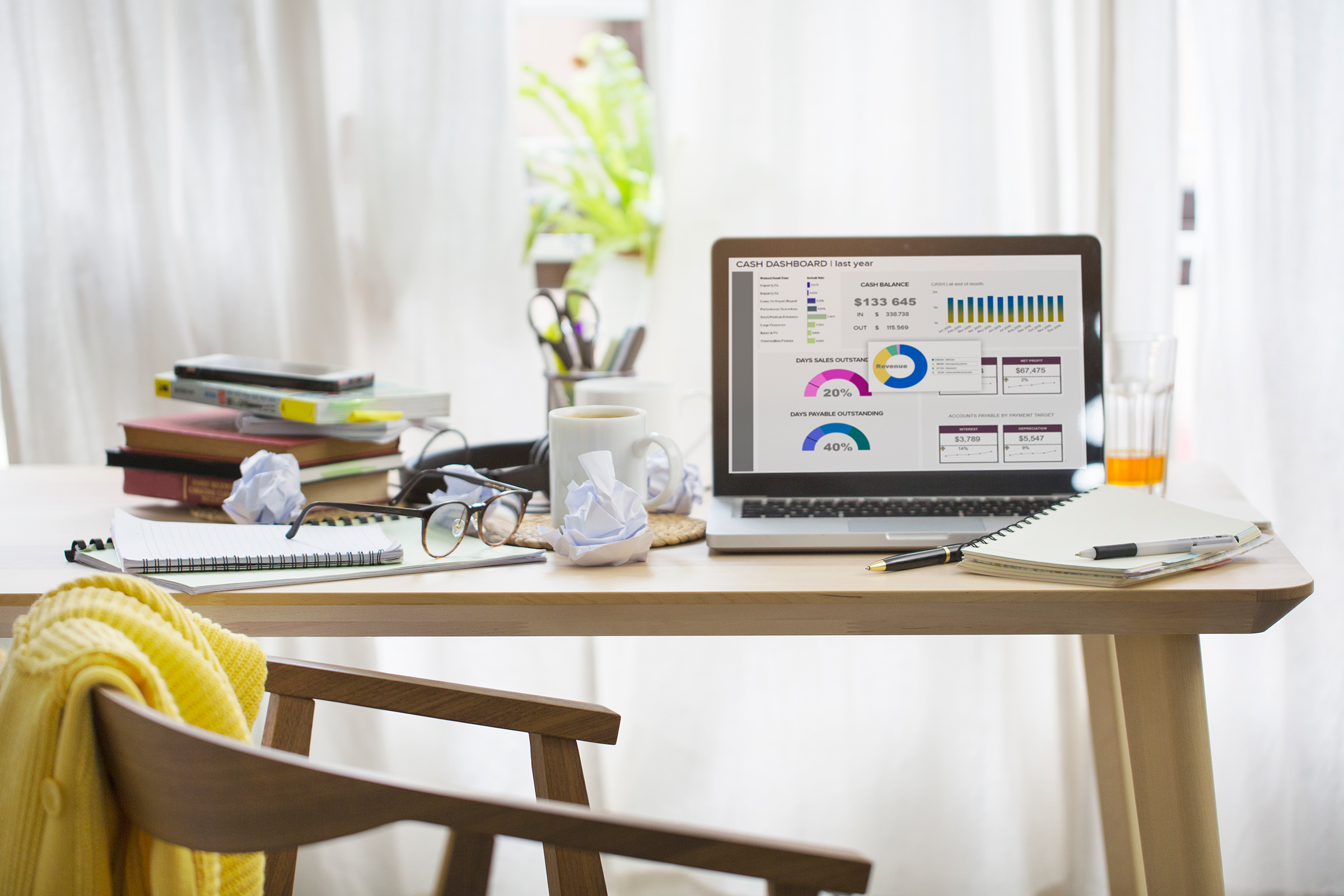
Scott Sonenshein is the co-author with Marie Kondo of Joy at Work. He is a chaired professor at Rice University and the bestselling author of Stretch. He received his PhD in organizational behavior from the University of Michigan and has written for the New York Times, TIME, Fast Company, and Harvard Business Review.
We’re all overwhelmed by the ways COVID-19 has disrupted our lives — and for many of us, working from home for the foreseeable future adds another layer of complication. If your work life was already a mess, as it is for many of us, then uprooting from the office can make it even messier. What’s worse, you risk bringing the mess home with you. But it doesn’t have to be that way. Here’s how you can work remotely without introducing clutter and chaos into your home life.
First, start with an organized physical space. Typically, our workspaces are cluttered with papers, old work in folders, expired snacks and lots of paperclips. When we tidy our space, we eliminate distractions, allowing us to focus and do our work efficiently and comfortably. Include only the essentials to get the job done: a computer, phone, headset, printer, highlighter, pen, and so on.
Second, although working from home may initially seem like a convenience, it can also add new challenges: how to get stuff done with the kids around and where to find a quiet space. Talk with family members about boundaries – what hours you will work, what space must be left alone to get your job done, and what can or can’t be going on in the background. Putting on professional clothes can act as a signal that you’re working and put yourself in a productive mindset. And make sure to take a break – there’s a lot going on right now and everyone needs a release. Get up and stretch. Go for a short walk around the block. The mind is still working, even when you’re not sitting at your computer. And breaks are so important for your physical health, which is more critical than ever.
Third, keep in mind that it may be trickier to relieve the tensions that often crop up in the workplace. Fights over budgets, getting credit for work, inter-departmental squabbles, and competing goals are common even under normal conditions. Without close physical contact, it might be harder to work through these messes. But you can still create a sense of connection with your colleagues, which can go a long way toward building goodwill and limiting friction.
Research shows that letting your colleagues view your personal space reduces psychological distance. So go ahead and show off your home office. And don’t worry too much if your toddler interrupts a virtual meeting. Although you might never invite some of your colleagues to your house, you can create connection with them by allowing them to see some of these humanizing sides of your life. And in these uncertain times, as we tackle crucial work together, it’s important that we focus on what we have in common – rather than our differences.
You can also be social, even with “social distancing.” Hop on conference calls a few minutes before the start time and chat up whoever joins early. Even a playful emoji in a text can build connection. During times of severe stress, everyone can benefit from building quality relationships. Psychologists find that joy can help undo some of the anxieties and other harms in our lives. So bring the water cooler or coffee break online and try to make someone laugh. Coordinate breaks and sip your beverage while talking informally with your colleagues over the phone or video conferencing.
Fourth, don’t take your bad email habits home with you. Filling your inbox — and your outbox — doesn’t mean you’re working more or getting more done. Without being together, it’s even more tempting to use email to show that we’re not slacking off. Instead, demonstrate your value by advancing the most critical projects and supporting colleagues with their own challenges. And practice good email etiquette. You don’t want to add to everyone else’s frustration by misusing email. A few tips:
Finally, use working from home to break unproductive routines. Due to our physical distance, a lot of informational meetings are going to turn into emails – and that’s a good thing. Meetings in the office tend to be too long and filled with too many people. Use remote work as an opportunity to streamline how often you meet and with whom. Also, say goodbye to multi-tasking, which research shows only disrupts our thoughts and results in lower productivity.
Messy desks, endless email, wasteful meetings, and multitasking are all clutter from the office that we shouldn’t bring home. When we eliminate them, we open up space to work efficiently on our most critical and satisfying work. Working without clutter boosts productivity and morale because it gives us more control over how we work. In these difficult times, we face a lot of disruption and uncertainty. But that doesn’t mean we can’t be productive. And focusing on the important, meaningful contributions we make at work can bring us a sense of calm — and even joy — that can be hard to come by right now.
More Must-Reads From TIME
- The 100 Most Influential People of 2024
- Coco Gauff Is Playing for Herself Now
- Scenes From Pro-Palestinian Encampments Across U.S. Universities
- 6 Compliments That Land Every Time
- If You're Dating Right Now , You're Brave: Column
- The AI That Could Heal a Divided Internet
- Fallout Is a Brilliant Model for the Future of Video Game Adaptations
- Want Weekly Recs on What to Watch, Read, and More? Sign Up for Worth Your Time
Contact us at letters@time.com